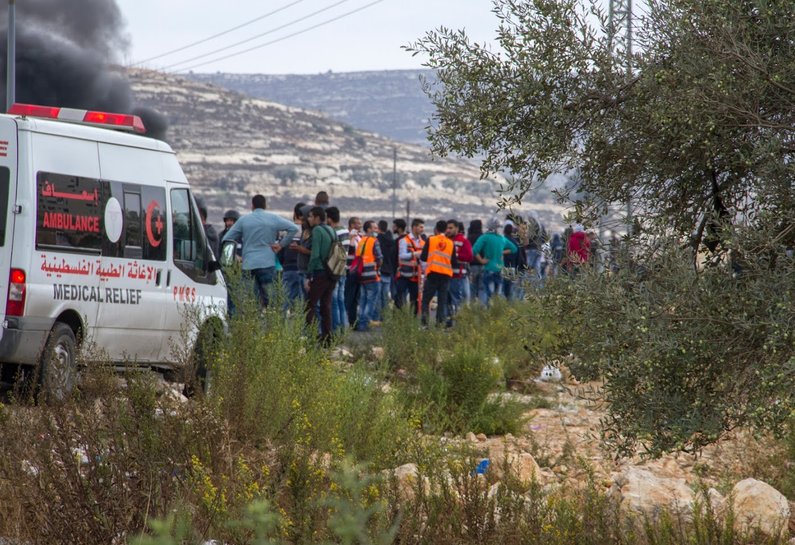MAP calls for accountability for violations against medical teams and killing of Palestinians

Last Friday, 15 December, two Palestinians from the West Bank and two from Gaza were shot dead during clashes between Palestinian protestors and Israeli forces. The Palestine Red Crescent Society (PRCS) reported that their teams treated at least 54 civilians injured across the West Bank including East Jerusalem, including four wounded by live ammunition, 11 by rubber-coated steel bullets, and 37 suffering tear-gas inhalation. According to the Palestinian Centre for Human Rights (PCHR), 192 civilians were injured during protests the same day in Gaza, including 18 children, two paramedics and two journalists. PCHR recorded 117 Palestinians hit with live bullets, 55 with tear-gas canisters, and dozens who suffered tear-gas inhalation.
Friday’s events brought the number of Palestinians killed since 7 December by Israeli forces to ten, with four killed before 15 December by airstrikes and two during clashes at protests. The PRCS has stated that its teams have treated more than 3,000 injured Palestinians since 7 December. PCHR has raised concerns about “indiscriminate use of excessive and disproportionate force against Palestinian civilians”.
These violations occur in the context of ongoing and pervasive failure of Israel to credibly investigate previously-recorded violations of the protected status of medical teams and facilities, including violent raids on a Jerusalem hospital in July 2017 and widespread attacks on hospitals, clinics and paramedics during the 2014 offensive on Gaza.The PRCS has also reported 14 violations by Israeli forces against its medical teams between 7 to 16 December. These incidents included four injuries to emergency medical staff, three restrictions to access or movement of medical teams, and four attacks against ambulances.
MAP CEO Aimee Shalan said: “It is vital for health workers to be able to perform their life-saving work without fear of attack. Israel must fully engage with all international efforts to promote impartial investigations into attacks on medical infrastructure and workers and pursue accountability when violations are identified to ensure the necessary guarantees for non-repetition.”
MAP continues to call for these new attacks and all potential violations of international humanitarian law to be investigated, and for those responsible held to account.
MAP also emphasises the still deteriorating living conditions in Gaza, with many of its 2 million inhabitants averaging just four hours of mains electricity daily, hospitals able to maintain only essential services and rising malnutrition reported after a decade of unlawful blockade and closure and 50 years of occupation by Israel.
The death of a double-amputee in Gaza
One of four Palestinians killed by Israeli forces during Friday’s protest clashes was Ibrahim Abu Thuraya, a 29-year-old a double lower-limb amputee. According to al-Mezan Centre for Human Rights, Abu Thuraya was shot in the forehead when he was 50 metres inside the border fence, unarmed and posing no threat to Israeli forces. An investigation by the Israeli military into his death announced on Sunday concluded yesterday that it found “no moral or professional failures” in the incident. Israeli, Palestinian and international human rights groups have repeatedly highlighted the lack of raised doubts credibility and effectiveness of internal Israeli military investigations.
Abu Thuraya’s killing occurred the same week MAP was in Geneva advocating for UN member states to urge Israel to protect and promote the rights and welfare of Palestinians with disabilities in their upcoming Universal Periodic Review, including taking all necessary measures to ensure the protection and safety of persons with disabilities in situations of risk.

